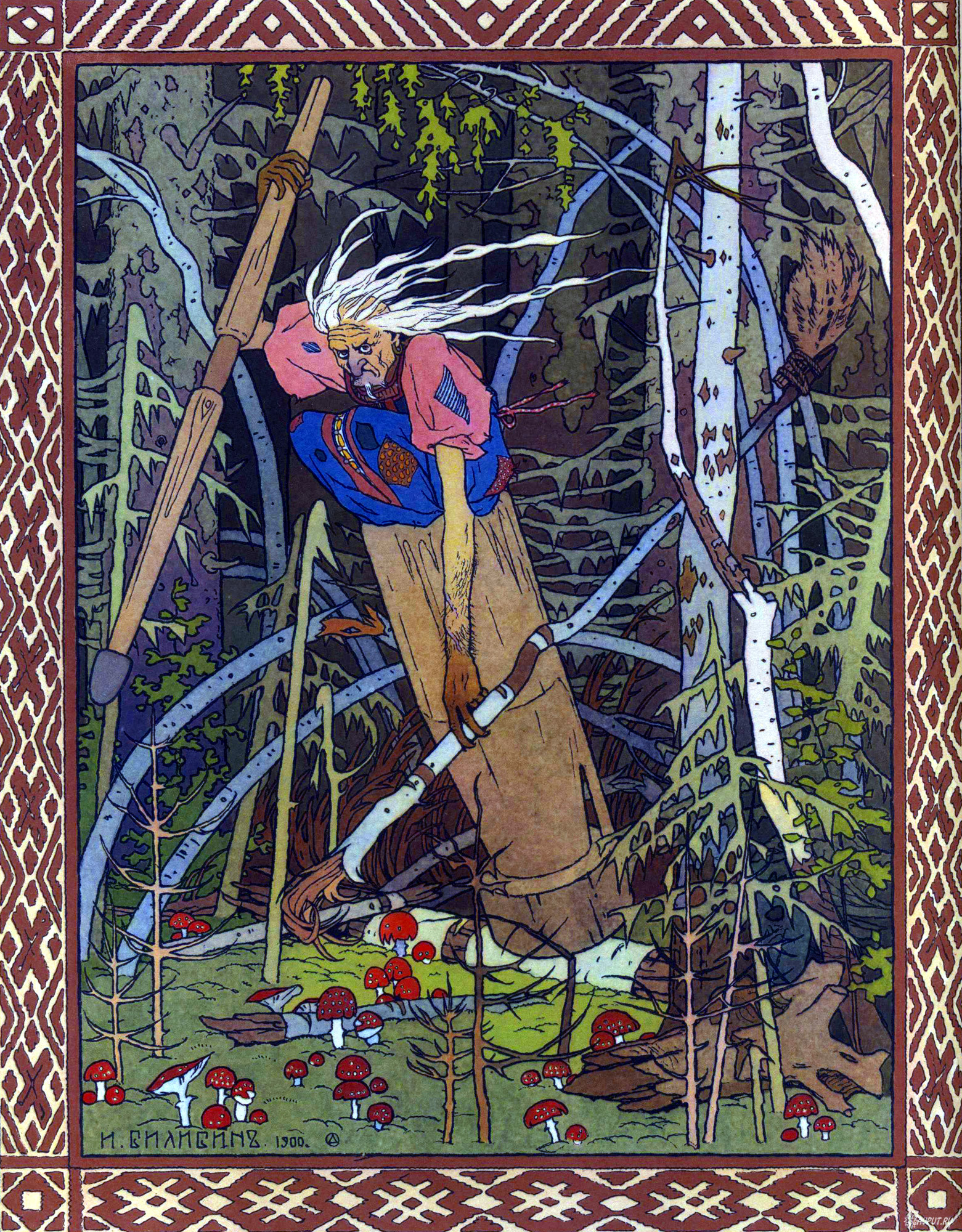The enigmatic witch in the woods.
Baba Yaga Lore
 Illustration by Ivan Bilibin
Illustration by Ivan Bilibin
We have heard the warnings as children. If we misbehave, Baba Yaga ("The Boogeyman") will take us away and devour us. Many know to avoid the bright, green lawn in the heart of the woods. Here is a tableau of translations for "Yaga" from across many cultures:
Horror, Shudder, Chill, Anger, Witch, Fury, Disease, Illness, Pain, Worry, To Abuse, To Belittle, To Exploit.
In the bathhouse, in a land of spirits, she binds workers into unescapable contracts by stealing their names. In the Tsardom across three times nine kingdoms, beyond high mountain chains, she dwells in the forest devouring children. In the Crookback Bog, in the swamps of Velen, she appears as three crones and twists the threads of the human lives in her region.
It would be easy to dismiss Baba Yaga as an evil witch. A tragedy to be avoided, summoned only by name when we desire control over our children. The truth is much more complicated. Andreas Johns, who studied her closely, described Baba Yaga as "strikingly ambiguous".
Read the stories for yourself and you will discover that she is both villian and benefactor. She is bound by strict contracts. If you understand the ancient rules she abides by, you may benefit greatly from her, even as she tries to deceive you. Of course she may just eat you.
The Bathhouse
As the ruler of the bathhouse (under the name Yubaba), she enslaves many to carry out her bidding. But her terms are made clear: remember your name and you are free. Throughout the events of Spirited Away she reveals that, while she can be cruel, she can also give praise where praise is due. Her ultimate drive is gold, not pure malevolence.
Vasilisa the Beautiful
When Vasilisa the Beautiful goes to Baba Yaga's hut in the woods to trade for fire, she finds the hut made entirely of human bones. Baba Yaga returns and eats enough meat, beer, and honey for five grown men, including the bones. But instead of devouring Vasilisa, she agrees to give her fire provided she can clean Baba Yaga's house. Vasilisa prevails over a series of increasingly impossible chores with the help of her mother's blessing and remains safe. At one point near the final day, Baba Yaga warns Vasilisa of the dangers of knowledge:
"Well," said the old witch, "only remember that every questions does not lead to good. If thou knowest overmuch, thou wilt grow old too soon."
She tries to trick Vasilisa into asking too many questions, but Vasilisa wisely refuses. Baba Yaga does really want to eat her, but she always makes the terms clear. In the end, the witch's fire is granted to Vasilisa who brings it home. The fire incinerates her evil mother and stepsisters, freeing Vasilisa to live her dream life.
The Crones of Crookback Bog
In the swamps of Velen live three crones named by the citizens as Brewess, Weavess, and Whispess. It is common for Baba Yaga to appear as three sisters. They communicate with the world using an enchanted tapestry. Many end up in the stewing pot kept by Brewess.
They help people who request it but for a gruesome fee, often taking an ear which they can later use to spy on the woods around their home. And yet, it is known in Velen, that the people survive the harshest times because of the old magic of the Crones. They demand utter obedience in return.
The Power of Baba Yaga
While Baba Yaga may take the form of three sisters, she is usually an old woman with unnaturally long arms and thin legs. She flies about the forest on top of an enchanted mortar and pestle, sweeping the ground behind her with an extended broom. Her hut and the gates around it jump to obey her verbal commands. You may sometimes spot the hut moving locations atop giant chicken legs. Like many witches, she may cast spells to transform herself into some sort of fowl, so that she may transport herself and remain inconspicuous. Depending on her mood, you may find her appearance comical or completely terrifying.
In the realm of myth the power of a thing is increased by our belief in it. The more stories we share about the gods and monsters, the more real they become. Our hearts are the engine of their creation. Baba Yaga has been with us for hundreds of years and thousands of stories. Her power is indisputable.
In Rossiiskaia grammatika, the first written appearance of Baba Yaga, her name appears on a list of Slavic gods. Next to every god is written their equivalent god from Roman mythology. Every god, that is, except for Baba Yaga.
Next to Baba Yaga is written nothing.
Written by Giles Ravensong.
